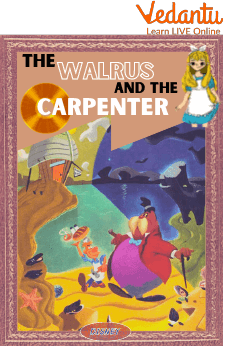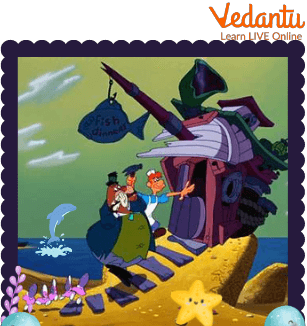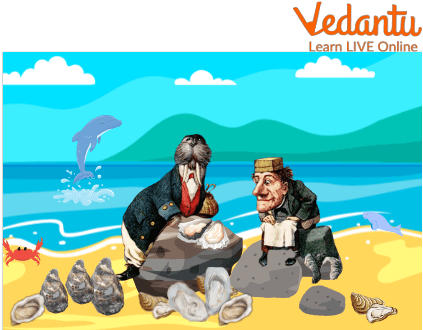Overview of Walrus and the Carpenter
Poems are a great way to learn emotions about a poet and what they are trying to say. It helps the kids and elders to become more comprehensive and detail-oriented. In the same way, this poem is a great way to learn about the poet’s emotions and what he is trying to say.
The Walrus and the Carpenter is a narrative poem that was written by Lewis Carroll. Interestingly, this poem was first published in his own book named “Through the Looking-Glass'' way back in 1871. This English author, poet, and mathematician was notable for his work in English culture. Further, in this article, we will talk of Walrus and Carpenter poem summary, the walrus and some theories related to it.
Walrus and the Carpenter Poem Lyrics
"The sun was shining on the sea,
Shining with all his might:
He did his very best to make
The billows smooth and bright —
And this was odd, because it was
The middle of the night.
The moon was shining sulkily,
Because she thought the sun
Had got no business to be there
After the day was done —
"It's very rude of him," she said,
"To come and spoil the fun."
The sea was wet as wet could be,
The sands were dry as dry.
You could not see a cloud, because
No cloud was in the sky:
No birds were flying overhead —
There were no birds to fly.
The Walrus and the Carpenter
Were walking close at hand;
They wept like anything to see
Such quantities of sand:
If this were only cleared away,'
They said, it would be grand!'
If seven maids with seven mops
Swept it for half a year,
Do you suppose,' the Walrus said,
That they could get it clear?'
I doubt it,' said the Carpenter,
And shed a bitter tear.
O Oysters, come and walk with us!'
The Walrus did beseech.
A pleasant walk, a pleasant talk,
Along the briny beach:
We cannot do with more than four,
To give a hand to each.'
The eldest Oyster looked at him,
But never a word he said:
The eldest Oyster winked his eye,
And shook his heavy head —
Meaning to say he did not choose
To leave the oyster-bed.
But four young Oysters hurried up,
All eager for the treat:
Their coats were brushed, their faces washed,
Their shoes were clean and neat —
And this was odd, because, you know,
They hadn't any feet.
Four other Oysters followed them,
And yet another four;
And thick and fast they came at last,
And more, and more, and more —
All hopping through the frothy waves,
And scrambling to the shore.
The Walrus and the Carpenter
Walked on a mile or so,
And then they rested on a rock
Conveniently low:
And all the little Oysters stood
And waited in a row.
The time has come,' the Walrus said,
To talk of many things:
Of shoes — and ships — and sealing-wax —
Of cabbages — and kings —
And why the sea is boiling hot —
And whether pigs have wings.'
But wait a bit,' the Oysters cried,
Before we have our chat;
For some of us are out of breath,
And all of us are fat!'
No hurry!' said the Carpenter.
They thanked him much for that.
A loaf of bread,' the Walrus said,
Is what we chiefly need:
Pepper and vinegar besides
Are very good indeed —
Now if you're ready, Oysters dear,
We can begin to feed.'
But not on us!' the Oysters cried,
Turning a little blue.
After such kindness, that would be
A dismal thing to do!'
The night is fine,' the Walrus said.
Do you admire the view?
It was so kind of you to come!
And you are very nice!'
The Carpenter said nothing but
Cut us another slice:
I wish you were not quite so deaf —
I've had to ask you twice!'
It seems a shame,' the Walrus said,
To play them such a trick,
After we've brought them out so far,
And made them trot so quick!'
The Carpenter said nothing but
The butter's spread too thick!'
I weep for you,' the Walrus said:
I deeply sympathize.'
With sobs and tears he sorted out
Those of the largest size,
Holding his pocket-handkerchief
Before his streaming eyes.
O Oysters,' said the Carpenter,
You've had a pleasant run!
Shall we be trotting home again?'
But answer came there none —
And this was scarcely odd, because
They'd eaten everyone."

The Walrus and The Carpenter Poem
Walrus and The Carpenter Poem Summary
We see the sun shining bright on the sea. Due to heavy sun rays, the waves are rising up and the tide is appearing shiny. The speaker depicts this as a strange situation because the sun doesn’t shine at midnight. Here, suddenly the moon is shining because the speaker thought the moon to be the sun. The speaker thinks the moon has got no business being there when the day is over. The little girl who is playing is interrupted by the sun and for this, she calls the sun rude.
The drive-home point in the sea is very wet, and the sand is parched. The whole sky was devoid of only two elements and they are the clouds and the birds. The main character makes their entry. The walrus and carpenter are seen walking together sad and shedding tears on the shore of the sea. The walrus thinks that the seven brooms for six months would be able to clear all the sand. Walrus spots a colony of oysters and invites them to walk with him and the carpenter. The walrus then limits the oysters to four, each of their hands is able to hold hands with one oyster.

The Walrus, Carpenter, and Oysters Walking Together
The eldest oyster answers all questions asked by the walrus. However, the oyster answers only with gestures. For example, he winks, moves his body, shakes hands, and many more.
Here, four young oysters are seen disobeying the walrus and carpenter. The oyster’s hairs appear to be washed, coats are brushed and are in great detail. The poet describes how the first four oysters continued to follow them. They grew in size while walking and the poet referred to this as “hopping” and “scrambling”. The speaker also believes that these creatures add great excitement to the sea environment. Finally, the walrus and carpenter are walking miles together. From afar, the walrus and carpenter are easily able to address the oysters who stand in a row at their feet.
The oysters are willing to start the conversation citing their exhaustion as the reason. Some oysters are seen to be very tired since they grew fat. When the carpenter tells them that the walrus is not in a hurry they thank the carpenter. The walrus say that they need a loaf of bread with little pepper. He asks the oysters if they are ready with a term of endearment. The walrus then suggests that they should begin their feast. The walrus continues to distract the oyster’s attention. Walrus says it was nice for oysters to accompany them.
On the other hand, the carpenter is only focused on food. The walrus addresses the carpenter that it might have been meant to make the oysters walk so fast. But, the carpenter feeling no sympathy focuses on his butter and slice of bread.

Walrus and Carpenter Eating Oysters
Again the walrus tries to pose a good image in front of all oysters. He says he can sympathise with them and holds his handkerchief in front of his eyes to stop the tears.
In the final stanza, the carpenter speaks to oysters saying their run has been good. He asks them that they shall begin their journey back together. Interestingly, he gets no reply from the oysters for they know that not one oyster is left uneaten by the Walrus.
The Theme of Walrus and The Carpenter
The theme for every poem depicts the actual reason for making them. Deception, death, and wisdom are the major themes of this poem. This is because they never thought of helping the oysters; they only intended to eat them in the end. This is why both walrus and the carpenter ask them to join them for a walk.
Summary
This poem depicts how everyone can be good and cruel at the same time. Everyone in this world only thinks of themselves and not of others. This poem has shown that selfishness is quite bigger than helpfulness in the world. Before trusting any stranger one must learn not to trust them in the first place itself. This way they can save their lives and not waste any useful materials for others. One can easily get the walrus and the carpenter summary PDF online. We hope you enjoyed reading this poem!


FAQs on Walrus and the Carpenter
1. What is the conflict in the walrus and carpenter poem?
The conflict depicted in this poem is that the walrus and carpenter were hungry so they ate oysters to resolve it.
2. Why were walrus and carpenter weeping?
The reason for the walrus and carpenter weeping was that there was sand in large quantities.
3. Why did the walrus beg?
The only reason why the walrus begged was that he wanted all the oysters to walk with them together. This is because they could eat them at the end and fill their hungry stomach.





